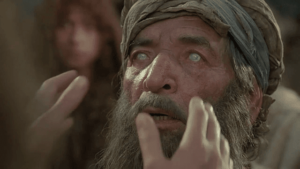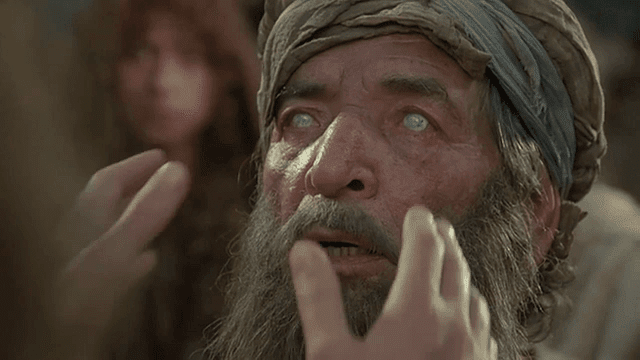
Central idea: Faith which saves. Doctrine: Faith is a gift of God. Practical application: Faith in action.
Written as an aid for homilists and a resource for the faithful, this doctrinal homily outline (1) provides insights into the Lectionary readings, (2) explicates a doctrine of Catholic Faith or morals from them, and (3) shows specific ways lay persons can live these truths. (To read more about this approach, click here.)
This outline is written to be in accord with the Homiletic Directory issued by the Congregation for Divine Worship and the Discipline of the Sacraments (2014).
To view Lectionary 149, click here.
Central idea: Faith which saves
Reading 1 Jer 31:7-9
Thus says the LORD:
Shout with joy for Jacob,
exult at the head of the nations;
proclaim your praise and say:
The LORD has delivered his people,
the remnant of Israel.
Behold, I will bring them back
from the land of the north;
I will gather them from the ends of the world,
with the blind and the lame in their midst,
the mothers and those with child;
they shall return as an immense throng.
They departed in tears,
but I will console them and guide them;
I will lead them to brooks of water,
on a level road, so that none shall stumble.
For I am a father to Israel,
Ephraim is my first-born.
- Adam and Eve were driven from the garden, the Israelite exiles left the promised land, and we enter the world in tears.
- We dwell in a vale of tears (as we pray in the Hail, Holy Queen), the valley of the shadow of death (as Psalm 23 puts it).
- But God promises the joy of redemption to his children, who are now “poor banished children of Eve,” infirm, dependent, undefended, with a hard lot.
- This redemption of our bodies an essential part of God’s promise, which we cling to in faith.
- Our faith tells us that one day we will reach our true home.
Responsorial Psalm Ps 126:1-2, 2-3, 4-5, 6
R. The Lord has done great things for us; we are filled with joy.
When the LORD brought back the captives of Zion,
we were like men dreaming.
Then our mouth was filled with laughter,
and our tongue with rejoicing.Then they said among the nations,
“The LORD has done great things for them.”
The LORD has done great things for us;
we are glad indeed.Restore our fortunes, O LORD,
like the torrents in the southern desert.
Those that sow in tears
shall reap rejoicing.Although they go forth weeping,
carrying the seed to be sown,
They shall come back rejoicing,
carrying their sheaves.
- Throughout our lives we are all sowing seed by the choices we make. Some day we will reap the harvest of what we have sown. Those of us who are older, seeing some of our choices bear bad fruit, are sobered and repentant and redouble our efforts to sow only the good seeds God wants.
- How we feel as we sow does not guarantee anything about the fruits of that sowing. As the psalmist tells us, “Those that sow in tears shall reap rejoicing.” It could be just as true that those who sow in laughter shall reap sorrowing. Or those who sow in revelry will reap in misery.
- Our care should be only to sow good seed—asking God that it be good, regardless of how we feel about it at the time. As long as we are here, it is never too late to sow more good seed, that is, to do God’s will in every situation.
Reading 2 Heb 5:1-6
Brothers and sisters:
Every high priest is taken from among men
and made their representative before God,
to offer gifts and sacrifices for sins.
He is able to deal patiently with the ignorant and erring,
for he himself is beset by weakness
and so, for this reason, must make sin offerings for himself
as well as for the people.
No one takes this honor upon himself
but only when called by God,
just as Aaron was.
In the same way,
it was not Christ who glorified himself in becoming high priest,
but rather the one who said to him:
You are my son:
this day I have begotten you;
just as he says in another place:
You are a priest forever
according to the order of Melchizedek.
- Ministerial priests in the Church have real authority because of their responsibilities. Yet interiorly they ought to be very humble. One reason is that they are themselves only weak men. Another is that they have this office only because it was entrusted to them by God. They have not “earned” it.
- Such a humble man should be very good in the confessional: “He is able to deal patiently with the ignorant and erring, for he himself is beset by weakness.” This is why after the penitent finishes accusing himself of sins, the first thing many good confessors say is, “Thank you for your good confession.”
Alleluia Cf. 2 Tm 1:10
Our Savior Jesus Christ destroyed death
and brought life to light through the Gospel.
- Two great truths we cannot see yet in reality are that Christ has destroyed death and bestowed on us who are his brothers and sisters not just immortal human life but LIFE: a share in his divinity.
Gospel Mk 10:46-52
As Jesus was leaving Jericho with his disciples and a sizable crowd,
Bartimaeus, a blind man, the son of Timaeus,
sat by the roadside begging.
On hearing that it was Jesus of Nazareth,
he began to cry out and say,
“Jesus, son of David, have pity on me.”
And many rebuked him, telling him to be silent.
But he kept calling out all the more,
“Son of David, have pity on me.”
Jesus stopped and said, “Call him.”
So they called the blind man, saying to him,
“Take courage; get up, Jesus is calling you.”
He threw aside his cloak, sprang up, and came to Jesus.
Jesus said to him in reply, “What do you want me to do for you?”
The blind man replied to him, “Master, I want to see.”
Jesus told him, “Go your way; your faith has saved you.”
Immediately he received his sight
and followed him on the way.
- Jesus left Jericho followed by his disciples and a sizable crowd and the formerly blind Bartimaeus.
- Perhaps because he was blind, Bartimaeus had learned to depend on his voice to get alms. Maybe he had learned to make his voice cut through the tumult of any crowd. At any rate, people told him to shut up.
- Bartimaeus already had a faith in Jesus or at least was willing to take a risk because when he heard it was Jesus passing by he did not seek money but the alms of sight.
- He threw aside his cloak. Why would a blind man cast his cloak aside? It is out of character. A blind man would have learned early on how easy it would be to lose something. Did he know that his cloak would slow him down if he got tangled up in it? Throwing his cloak aside reinforces that he began his encounter with Jesus with faith, because he wanted to get to Our Lord as quickly as he could. Whatever Jesus could do for him was going to be worth much more than his cloak.
- In this way he is like the man in the parable who finds a treasure buried in a field or in the parable of the jeweler who found a pearl of great price. Both put all their resources toward gaining their respective treasures.
- After Jesus gave Bartimaeus his sight, the Lord said “go on your way.” Bartimaeus did go on his way. He “followed him on the way.” Jesus became Bartimaeus’ way. Christ is our way too.
Doctrine: Faith is a gift of God
Faith is the theological virtue by which we believe in God and believe all that he has said and revealed to us, and that Holy Church proposes for our belief, because he is truth itself (CCC 1814).
- First, God offers us the gift of faith, and with his help we assent to what he proposes that we believe.
- We can do so in the confidence that God can neither deceive nor be deceived.
- But faith is not just mental assent. “By faith ‘man freely commits his entire self to God.’ For this reason the believer seeks to know and do God’s will.” (CCC 1814)
- “The disciple of Christ must not only keep the faith and live on it, but also profess it, confidently bear witness to it, and spread it . . . Service of and witness to the faith are necessary for salvation.” (CCC 1816)
Practical application: Faith in action
- God gives us the gift of faith and the graces to use this gift the way he wants us to.
- He wants us to believe what he has revealed and entrusted to his Church. This means we must know the deposit of faith. We need to receive doctrinal formation regardless of our age or level of education.
- Is doctrinal formation part of our everyday life?
- He wants us to put the faith into practice in our ordinary lives because “faith apart from works is dead” (Jas 2:26).
- Do our ordinary actions conform to the natural moral law (the ten commandments), to the two great commandments (love God above all and neighbor as self), and the law of the Gospel (will the good of the other even to the point of sacrifice)?
- He wants us to spread the faith. “Every one who acknowledges me before men, I also will acknowledge before my Father who is in heaven; but whoever denies me before men, I also will deny before my Father who is in heaven” (Mt 10:32-33).
- Are we apostles, too?
- He wants us to believe what he has revealed and entrusted to his Church. This means we must know the deposit of faith. We need to receive doctrinal formation regardless of our age or level of education.
The Homiletic Directory offers the following Catechism points and themes for the Thirtieth Sunday in Ordinary Time:
- CCC 547-550: Jesus performed messianic signs
- CCC 1814-1816: faith, a gift of God
- CCC 2734-2737: filial confidence in prayer

Leave a Reply